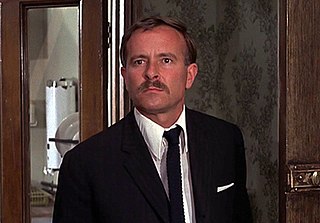Related Research Articles
Professor Frank McGuinness is an Irish writer. As well as his own plays, which include The Factory Girls, Observe the Sons of Ulster Marching Towards the Somme, Someone Who'll Watch Over Me and Dolly West's Kitchen, he is recognised for a "strong record of adapting literary classics, having translated the plays of Racine, Sophocles, Ibsen, Garcia Lorca, and Strindberg to critical acclaim". He has also published six collections of poetry, and two novels. McGuinness was Professor of Creative Writing at University College Dublin (UCD) from 2007 to 2018.

The 36th (Ulster) Division was an infantry division of the British Army, part of Lord Kitchener's New Army, formed in September 1914. Originally called the Ulster Division, it was made up of mainly members of the Ulster Volunteer Force, who formed thirteen additional battalions for three existing regiments: the Royal Irish Fusiliers, the Royal Irish Rifles and the Royal Inniskilling Fusiliers. However, regular Officers and Soldiers and men from all around the United Kingdom made up the strength of the Division. The division served from October 1915 on Western Front as a formation of the British Army during the Great War.
No Man's Land is a play by Harold Pinter written in 1974 and first produced and published in 1975. Its original production was at the Old Vic theatre in London by the National Theatre on 23 April 1975, and it later transferred to Wyndham's Theatre, July 1975 – January 1976, the Lyttelton Theatre April–May 1976, and New York's Longacre Theatre from October–December 1976. It returned to the Lyttelton from January – February 1977. It is a two-act play.

Alexander Duncan McCowen, was an English actor. He was known for his work in numerous film and stage productions.

The culture of Northern Ireland relates to the traditions of Northern Ireland. Elements of the Culture of Ulster and the Culture of the United Kingdom are to be found.

Marina Carr is an Irish playwright, known for By the Bog of Cats (1998).
Risteárd Cooper is an Irish actor, comedian, singer and writer and is one third of comedy trio Après Match.
Ian Adamson OBE was an Ulster Unionist Party (UUP) politician and paediatrician, who was the Lord Mayor of Belfast from 1996 to 1997. He was a Member of the Northern Ireland Assembly (MLA) for East Belfast from 1998 to 2003.
Reece Dinsdale is an English actor and director of stage, film and television. He is a Huddersfield Town fan. In 2017 he became a patron of the Square Chapel, an arts centre in Halifax. He is also an honorary patron of The Old Courts multi-arts centre in Wigan

Faith Healer is a play by Brian Friel about the life of the faith healer Francis Hardy as monologued through the shifting memories of Hardy, his wife, Grace, and stage manager, Teddy.

Sir Charles Norman Lockhart Stronge, 8th Baronet, MC, PC, JP was a senior Ulster Unionist Party politician in Northern Ireland.
James Phillips is a British playwright, director and photographer.
Dashiell Eaves is an American actor. He lives in New York City.

The Offence is a 1973 British crime neo noir drama film directed by Sidney Lumet, based upon the 1968 stage play This Story of Yours by John Hopkins. It stars Sean Connery as police detective Johnson, who kills suspected child molester Kenneth Baxter while interrogating him. The film explores Johnson's varied, often aggressive attempts at rationalizing what he did, revealing his true motives for killing the suspect in a series of flashbacks. Trevor Howard and Vivien Merchant appear in major supporting roles. Bannen was nominated for a BAFTA award for his performance.
Thelma Holt is a British theatre producer and former actress.
Michael Ritchie is formerly an American artistic director of Center Theatre Group, overseeing the Mark Taper Forum, the Ahmanson Theatre and the Kirk Douglas Theatre.
Headlong is a British touring theatre company noted for making bold, innovative productions with some of the UK’s finest artists.

Richard Dormer is a Northern Irish actor, playwright and screenwriter. He is best known for his roles as Beric Dondarrion in the HBO television series Game of Thrones and Dan Anderssen in Sky Atlantic's Fortitude.
Robin Lefevre is a British theatre director. He has worked in Britain, Ireland, Australia, and the United States.
Lalor Roddy is a Northern Irish actor, described by the Irish Times theater critic Fintan O'Toole as "surely the finest Irish actor of his generation".
References
- ↑ "Abbey Theatre - Amharclann na Mainistreach". Abbeytheatre.ie. Retrieved 1 December 2014.
- ↑ McGuinness, Frank. Observe the Sons of Ulster Marching Towards the Somme. London: Faber and Faber, 1986.
- ↑ Michael Billington (23 June 2009). "Theatre review: Observe the Sons of Ulster Marching Towards the Somme / Hampstead, London". the Guardian. Retrieved 1 December 2014.